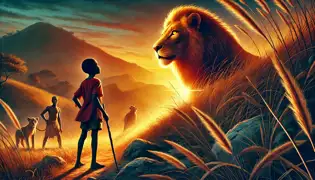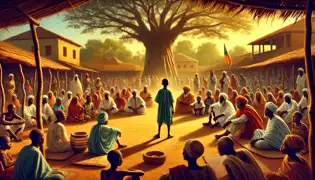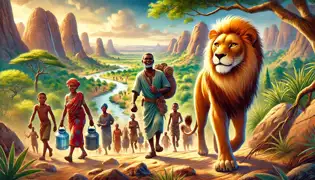The Lion King of Bamako
Reading time: 7 min

About this story: The Lion King of Bamako is a Legend from Mali set in the Contemporary. This Descriptive tale explores themes of Courage and is suitable for All Ages. It offers Moral insights. A tale of courage, unity, and the bond between a boy and a lion in the heart of Mali.
Bamako, a city that pulses with the rhythm of djembes and the warmth of the Niger River, is a place where ancient legends meet modern life. Beneath the golden sun of Mali, this bustling capital hides stories as old as the hills. One such story belongs to a boy named Kélé and his journey to become the "Lion King of Bamako." It is a tale of bravery, sacrifice, and the unbreakable bond between a boy, a lion, and the city they both called home.
A Boy and His Dreams
The streets of Bamako were alive. Vendors shouted over one another, selling fresh mangoes, handmade jewelry, and colorful textiles that gleamed under the midday sun. Kélé, just fourteen, darted through the crowds with a basket of fish balanced on his head. The boy had energy to rival the markets themselves, and his laughter rang out as he weaved through the chaos.
Kélé wasn’t like the other boys in his neighborhood. While they played games or helped their fathers in the fields, Kélé spent hours by the Niger River, watching the way it flowed—strong, steady, and unyielding. His mother often scolded him for daydreaming, but Kélé couldn’t help it. He was searching for something, though he didn’t yet know what.
That search began to take shape one afternoon when he overheard the elders at the market. They whispered about a lion, majestic and golden, spotted near the outskirts of Bamako. “A sign,” one of them murmured. “A blessing, or a warning.”
The lion ignited Kélé’s imagination. That night, he couldn’t sleep. He lay awake, staring at the thatched roof of his family’s hut, wondering what it would be like to stand face-to-face with such a creature. The idea thrilled and terrified him in equal measure.
The First Encounter

Dawn broke, and with it came the call of adventure. Kélé rose quietly, careful not to wake his parents. Armed with a worn walking stick and a bag of millet cakes, he slipped into the bush. His heart raced as he followed the path out of Bamako, the sounds of the city fading behind him.
The hours dragged on, but Kélé pressed forward. He traced paw prints in the dirt and listened for the rustle of tall grasses. As the sun began to dip low in the sky, he found himself standing on a rocky hill. There, bathed in the golden light of dusk, was the lion.
Kélé froze. The lion was larger than he had imagined, its mane shimmering like liquid fire. Its eyes—deep, amber pools—met his, and for a moment, time seemed to stop. Fear gripped him, but so did something else: awe.
Before he could react, shouts broke the stillness. A group of hunters emerged from the brush, their bows drawn. Panic surged through Kélé as he realized their intention. Without thinking, he stepped between the hunters and the lion, raising his arms wide.
“Stop!” he shouted, his voice cracking. “It’s not attacking anyone! Let it go!”
The hunters hesitated, their eyes flicking between the boy and the beast. The lion, sensing its chance, disappeared into the shadows. Kélé stood trembling, his heart pounding like a drum. He had saved the lion, but he knew this was only the beginning.
The Bond Grows
Word of Kélé’s daring act spread quickly. In the crowded streets of Bamako, people whispered about the boy who had stood before a lion and lived to tell the tale. Some called him brave; others, foolish. The elders, however, took a keen interest.
One elder, Amadou, summoned Kélé to his hut. The old man’s voice was rough, like the bark of a baobab tree, but his eyes were kind. “The lion spared you,” he said. “Do you know why?”
Kélé shook his head.
“Lions don’t trust easily,” Amadou continued. “But when they do, their loyalty is unmatched. You are bound to it now, Kélé. Protect it, and it will protect you.”
The boy didn’t fully understand the elder’s words, but they stayed with him. Over the following weeks, he returned to the hills, searching for the lion. Each time, he brought offerings—fish, goat meat, even water from the river. Slowly, the lion began to trust him.
Kélé named the lion “Fari,” which meant “king.” They formed an unlikely partnership, the boy and the beast. Fari seemed to understand Kélé’s words, and Kélé, in turn, learned to read the lion’s movements. It was as though they shared a language all their own.
Trouble in the Village

Not everyone in Bamako was as accepting of the lion as Kélé was. Reports of missing livestock began to circulate, and though no one could prove Fari was responsible, fear spread like wildfire. Traders passing through the city muttered about cursed lions, and some villagers demanded action.
A meeting was called in the central square. The elders debated for hours, their voices rising in heated argument. Finally, Amadou stood and addressed the crowd.
“Kélé,” he said, beckoning the boy forward. “This lion of yours—it has brought both hope and fear to our people. If you wish to protect it, you must prove it is a blessing and not a curse.”
Kélé nodded solemnly. “I will,” he said, though his voice trembled. He didn’t know how, but he was determined to keep his promise.
The Drought
Not long after the meeting, disaster struck. The rains failed, and the land began to wither under the relentless sun. Crops dried up, and the Niger River shrank. Desperation took hold of Bamako, and with it came more accusations.
“It’s the lion!” some shouted. “It has angered the spirits!”
Kélé refused to believe it. He spent his days searching for water, following the paths Fari showed him. One evening, deep in the hills, Fari led him to a hidden spring. The water was cool and clear, a lifeline for the struggling village.
Kélé returned to Bamako with the news, but convincing the villagers to trust him—and the lion—was no easy task.
The Journey to the Spring

The elders agreed to let Kélé lead a group to the spring, but their skepticism was clear. “If you fail,” Amadou warned, “there will be no saving the lion.”
The journey was treacherous. The group faced blistering heat, venomous creatures, and exhaustion. Fari walked alongside them, his presence both comforting and intimidating. Some villagers grumbled about trusting a beast, but Kélé reminded them of their goal.
After three days, they reached the spring. The sight of the water brought cheers and tears. Kélé watched as the villagers drank their fill, their faith in him—and Fari—restored.
A Legacy Carved in Stone

With the water from the spring, Bamako survived the drought. The villagers began to see Fari not as a threat, but as a symbol of resilience. They built a small shrine near the spring, dedicating it to the lion and the boy who had saved them.
Kélé grew into a man, but he never forgot the lessons he learned from Fari. Though the lion eventually left the hills, its presence was felt in the stories and songs of Bamako. Kélé became a leader, guiding his people with the same courage and wisdom he had shown as a boy.
Today, the tale of the Lion King of Bamako lives on, passed down through generations. It is a reminder that even the wildest hearts can find harmony, and that true leadership is born from understanding, not fear.


















